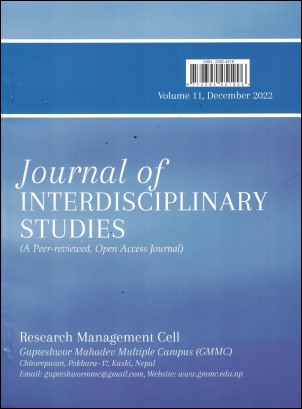Capitalism and Marriage Practices- A case study of Pokhara Metropolitan City
DOI:
https://doi.org/10.3126/jis.v11i1.58681Keywords:
Marriage, Capitalism, Decision making power, RelationshipAbstract
For the most of human history, the family was primarily concerned with producing economic output. Families were built around production, thus choosing a spouse depended on how effectively one could both produce, including having more kids to supply the labor for farm or small business needed. Women and men were "yoke mates," as Stephanie Coontz, the family historian, put it. Marriages were about the ties of what economists call “complementary productive human capital.” The rise of industrial system led to an increase in the amount of work performed outside of the home where people made bundle of social relationships. This all phenomenon results changes in marriage practice and love marriage becomes dominant features of capitalism where husband-wife relationship resolved around similar interests and consumption habits for rising the prosperity and easiness of life.
This paper examines the changing trends of marriage in capitalistic society and the factors affecting the selection of mate by arguing that selecting mate is not a personal decision but its outcome of particular form of society type and nature. The evidences presented here use data from both secondary literature and primary sources. The primary data have been purposively selected using case study methods on Pokhara Metropolitan city. Particular attention is paid to the transformation of marriage practices in city area with the rise of capitalism. The results indicate that the marriage institution have been changing rapidly than ever before with the rapid expansion of market economy, migration, education and communication which is directly or indirectly related to the personal decision of individuals mate selection process. The study also provides a more nuanced understanding of the involvement of men and women in decision making process for the selection of mate despite their caste and class.




